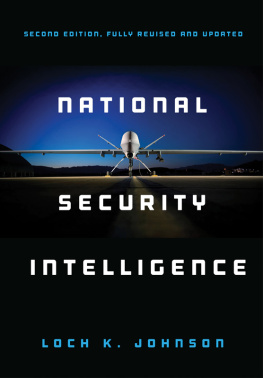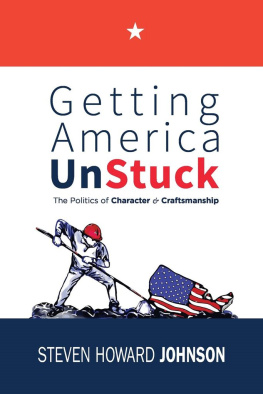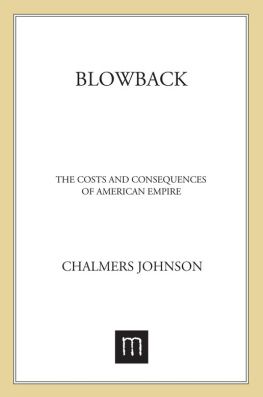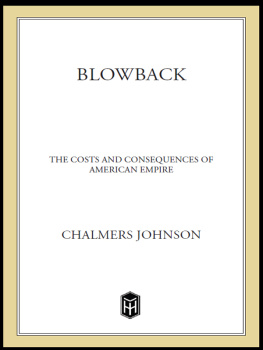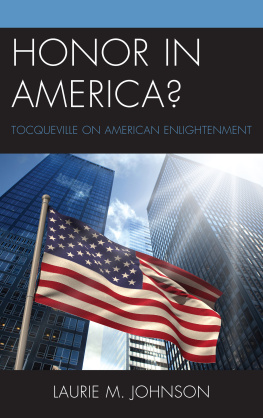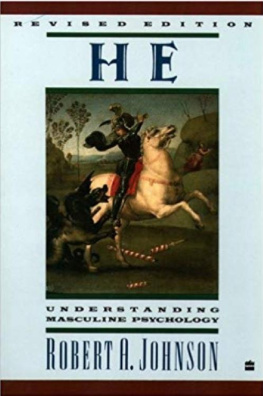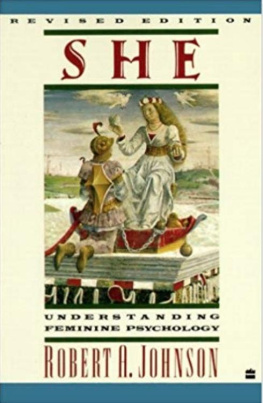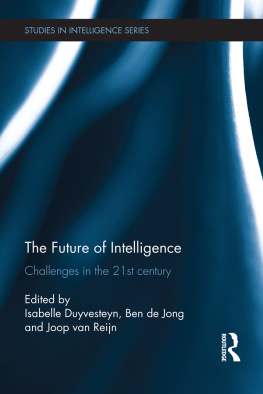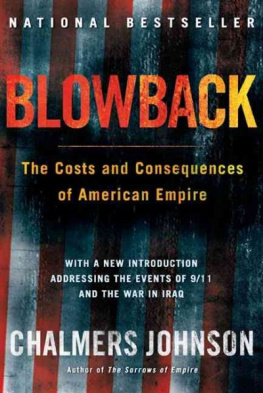
Bombs, Bugs, Drugs, and Thugs
Loch K. Johnson
BOMBS, BUGS,
DRUGS, AND
THUGS
INTELLIGENCE AND
AMERICAS QUEST
FOR SECURITY
With a New Preface
by the Author
a
New York University Press
New York and London
N E W Y O R K U N I V E R S I T Y P R E S S
New York and London
First published in paperback in 2002.
Copyright 2000 by New York University
All rights reserved
Library of Congress Cataloging-in-Publication Data
Johnson, Loch K., 1942
Bombs, bugs, drugs, and thugs : intelligence and Americas quest for security / Loch K. Johnson.
p.
cm.
Includes bibliographical references and index.
ISBN 0-8147-4252-1 (cloth : alk. paper)
ISBN 0-8147-4253-X (pbk. : alk. paper)
1. Intelligence serviceUnited States.
I. Title.
JK468.I6 J634 2000
327.1273dc21
00-055027
New York University Press books are printed on acid-free paper, and their binding materials are chosen for strength and durability.
Manufactured in the United States of America
10 9 8 7 6 5 4 3 2 1
To Harry Howe Ransom
mentor and dear friend
and to Kristin
daughter and young scholar extraordinaire
The important thing about foreign policy is this: There are a lot of important objectives: democracy is one of these, security is another, prosperity is another one, environment is another one. So you have to see how you give emphasis to these objectives at any moment in time.
Henry A. Kissinger, interviewed by Suchichai Yoon, Nation, Bangkok newspaper, March 8, 1999, A5.
C O N T E N T S
A New Preface by the Author
xi
Preface
xix
List of Figures
xxiiii
List of Abbreviations
xxv
Introduction
PA R T I : An Intelligence Agenda for a New World 1. A Planet Bristling with Bombs and Missiles
2. Stocks and (James) Bonds: Spies in the Global Marketplace 32
3. The Greening of Intelligence
4. Spies versus Germs: A Worldwide Resurgence of Bugs 72
PA R T I I : Strategic Intelligence: Fissures in theFirst Line of Defense
5. The DCI and the Eight-Hundred-Pound Gorilla
6. Spending for Spies
7. Sharing the Intelligence Burden
PA R T I I I : Smart Intelligenceand Accountable 8. More Intelligent Intelligence
9. Balancing Liberty and Security
Appendix: Americas Intelligence Leadership, 19412000
Notes
Bibliography
Index
About the Author
| ix |
A N E W P R E F A C E B Y T H E A U T H O R
The tragic terrorist attacks of September 11, 2001, directed against the World Trade Center in New York City and the Pentagon in Washington, D.C., caught us by surprise. It was the worst intelligence failure in the history of the United States. We must now try to understand why we were caught flatfooted and move quickly to strengthen our intelligence capabilitiesthe nations first line of defense. This book, published several months before the attack, addressed the danger of terrorists and other perils facing the United States. In light of the events of September 11 and continuing terrorist threats, the need to strengthen this nations intelligence shield has become all the more compelling.
Intelligence, the means by which we acquire and assess information apt to protect this nation from harm, is a process that has several phases, from planning, collection, and processing to analysis and dissemination.
If the United States is to be successful in thwarting future terrorist operations against these shores, we will have to undertake extensive reforms to correct the weaknesses in each of these steps.
The planning phase involves deciding which nations and groups abroad and at home warrant intelligence surveillance. At the beginning of every administration, White House officials work with the Director of Central Intelligence (the DCI, who heads Americas thirteen secret agencies) to prepare a threat assessmenta priority listing of the most dangerous perils faced by the United States. These officials then determine how much money from the annual intelligence budget (reportedly about $30 billion prior to the September attacks) will be spent tracking the activities of each target.
This planning stage is critical; unless a target is taken seriously in the initial setting of priorities in Washington, D.C., it is unlikely to receive much attention by those with responsibilities for collecting information in the field. During the cold war, the United States concentrated mainly on gathering intelligence about the Soviet Union and other Communist
| xi |
A New Preface by the Author
powers, neglecting lesser targets like Afghanistan and the rest of South Asia (where we found ourselves surprised by the hostility toward the United States displayed by the Taliban regime in Afghanistan, as well as the Indian nuclear test in 1998). Terrorism has risen steadily on the list of intelligence priorities since the end of the cold war, but until September 11 it remained just one of several demands on the resources of the U.S. intelligence agencies, including North Korea, Iraq, Iran, China, and Russia (whose massive nuclear arsenal has kept the attention of Washington officials).
Now terrorism holds a position of preeminence on Americas threat list, resulting in a greater focus of our worldwide intelligence resources on Osama bin Laden and his al-Qaida network.
The collection phase became skewed as well during the cold war, in a manner that has further harmed Americas counterterrorist preparedness. Understandably awed by the technological capabilities of satellites and reconnaissance airplanes (U-2s, SR-21s, unmanned aerial vehicles or UAVs), officials poured most of the intelligence budget into surveillance machines capable of photographing Soviet tanks and missile silos and eavesdropping on telephone conversations in Communist capitals. Human spy networks became the neglected stepchild of intelligence.
Machines certainly have their place in Americas spy defenses and they are currently playing an important role in Afghanistan, as satellites hover over its mountains taking photographs and UAVs swoop into its valleys in search of al-Qaida terrorists and their Taliban accomplices. But machines cannot peer inside caves or see through the canvass tents or the roofed mud huts where terrorists gather to plan their lethal operations.
A secret agent in the enemys camp is necessary to acquire this kind of informationthe only kind of information likely to give us advance warning of future attacks. Human intelligence (HUMINT) remains the key to protecting the United States against terrorist attacks.
HUMINT networks take time to develop, though, and only recently has the DCI launched a major recruitment drive to hire Americans into the CIA with language skills and knowledge about Afghanistan and other parts of the world largely ignored by the United States. Intelligence officers with these skills are needed to recruit local agents overseas who do the actual snooping for the CIA.
| xii |
A New Preface by the Author
The September attacks will accelerate these efforts, although finding American citizens who speak pasto, Arab, and farsi and want to work for the intelligence agenciesoperating overseas in less than luxurious (and sometimes dangerous) conditions at a modest government salarymay prove difficult.
When the director of the National Security Agency (NSA, which collects electronic information around the world) was asked recently what his major problems were, he replied, I have three: processing, processing, and processing.
Next page

